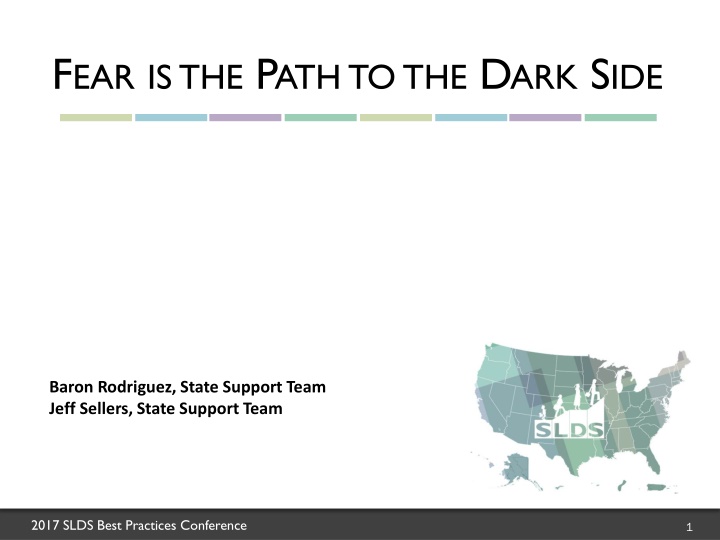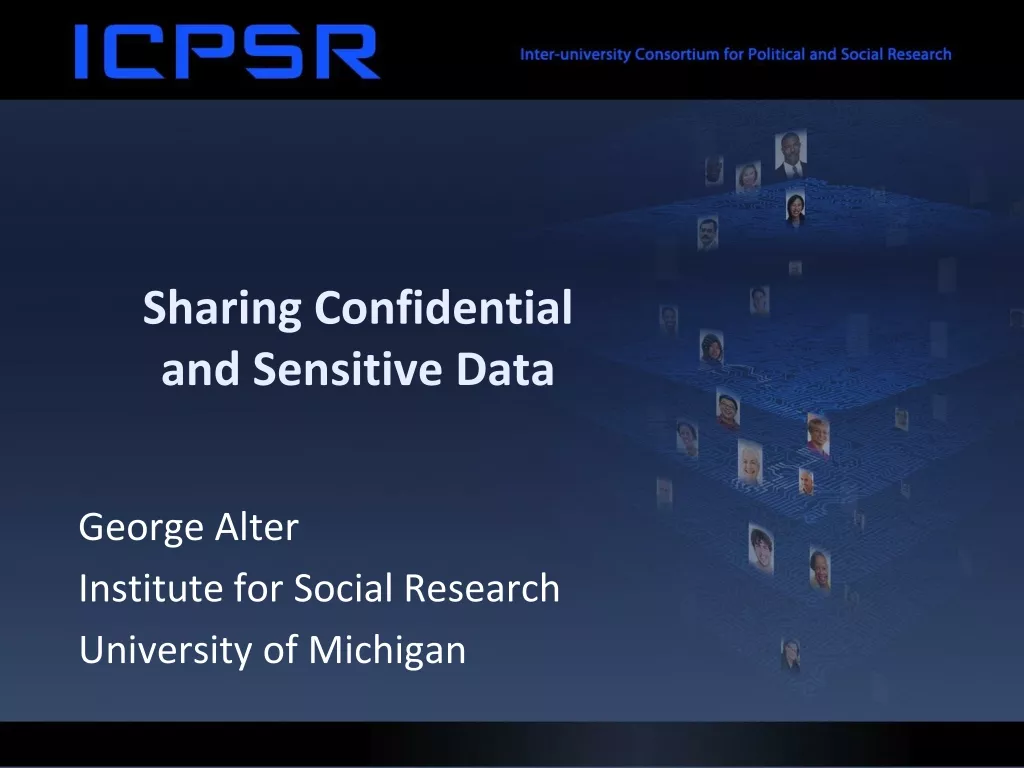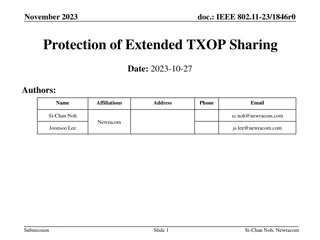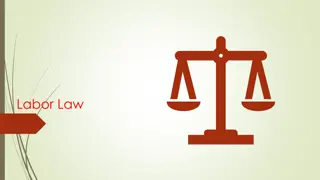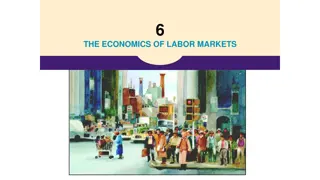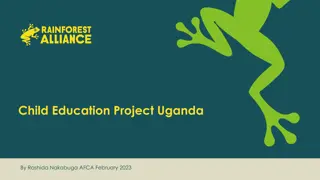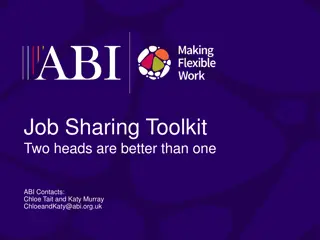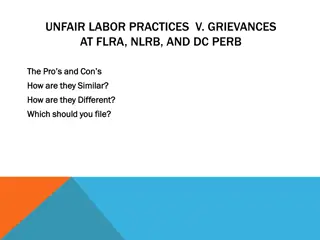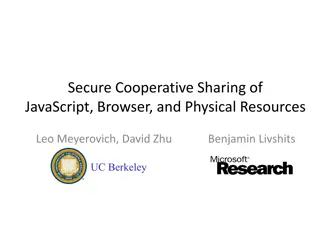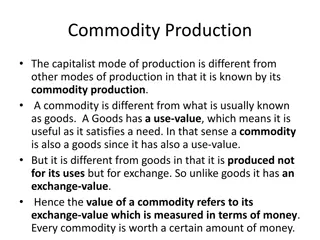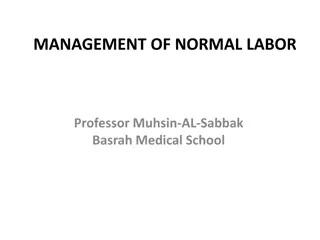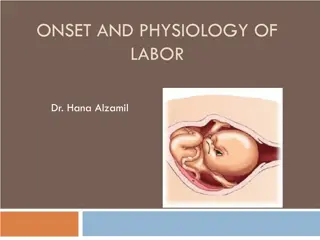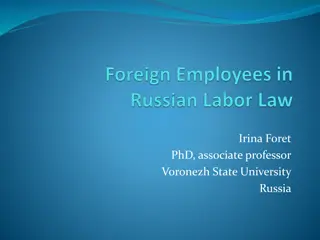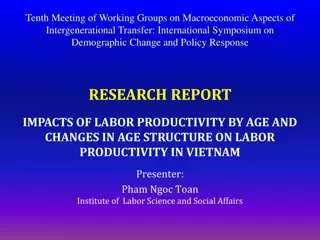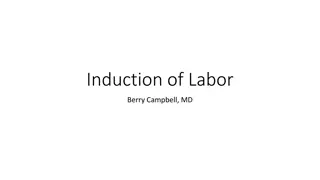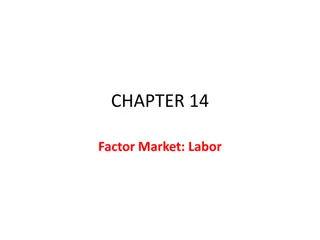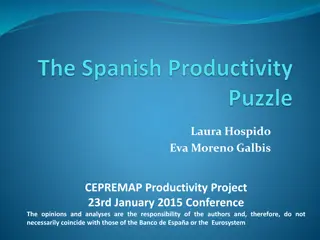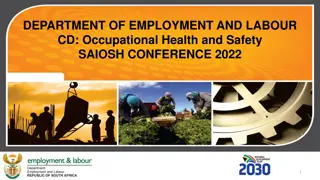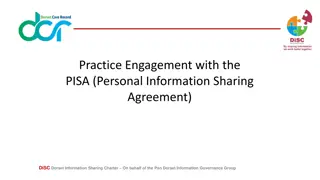Achieving Data Sharing Success in Education and Labor Agencies
Gain insights into overcoming barriers and sharing data between education and labor agencies at the 2017 SLDS Best Practices Conference. Sessions cover objectives, success stories, FERPA demystification, and compliance scenarios. Learn valuable lessons for achieving success and navigating challenges in data sharing initiatives.
Download Presentation

Please find below an Image/Link to download the presentation.
The content on the website is provided AS IS for your information and personal use only. It may not be sold, licensed, or shared on other websites without obtaining consent from the author.If you encounter any issues during the download, it is possible that the publisher has removed the file from their server.
You are allowed to download the files provided on this website for personal or commercial use, subject to the condition that they are used lawfully. All files are the property of their respective owners.
The content on the website is provided AS IS for your information and personal use only. It may not be sold, licensed, or shared on other websites without obtaining consent from the author.
E N D
Presentation Transcript
FEARISTHE PATHTOTHE DARK SIDE Baron Rodriguez, State Support Team Jeff Sellers, State Support Team 2017 SLDS Best Practices Conference 1
SESSION OBJECTIVES Gain an understanding of current barriers (real & perceived) for linking/sharing data between education & labor agencies 2017 SLDS Best Practices Conference 2
SESSION OBJECTIVES Gain an understanding of mutually agreeable objectives to help facilitate sharing and motivation for both agencies. 2017 SLDS Best Practices Conference 3
SESSION OBJECTIVES Learn success stories from peer state agencies on how to achieve success of the impossible task. 2017 SLDS Best Practices Conference 4
DEMYSTIFYING FERPA "Ahh, hard to see, the Dark Side is. - Yoda True or False? Personally identifiable data can t be shared with a non- education agency. 2017 SLDS Best Practices Conference 5
DEMYSTIFYING FERPA True or False? Personally identifiable data coming back to my SLDS is the only way I can accomplish WIOA and/or labor policy questions. 2017 SLDS Best Practices Conference 6
GAMESHOW TIME!! FERPA Issue or Not? A Tea Party legislator comes to your agency and says that his constituents are asking for a Federal Education Rights and Privacy Act (FERPA) opt-out for all statewide longitudinal data systems (SLDS)/Workforce Data Quality Initiative (WDQI)/federal collections. You contact the Privacy Technical Assistance Center (PTAC) helpdesk and Baron answers. Does he tell you it s a FERPA issue or not? 2017 SLDS Best Practices Conference 7
GAMESHOW TIME!! FERPA Issue or Not? Your state education agency has an employee who uses their personal account (without your permission) to analyze student data. By terrible coincidence, the account gets compromised and the data gets exposed to the outside world. Is your agency subject to FERPA compliance review? 2017 SLDS Best Practices Conference 8
GAMESHOW TIME!! FERPA Issue or Not? A researcher asks for data from your WDQI/SLDS. You immediately tell them that you can t do that without a written agreement. Does this have to be a FERPA issue? Explain! 2017 SLDS Best Practices Conference 9
DEMYSTIFYING DATA SHARING True or False? States, not the federal government, are ultimately responsible for defining who is a public official who can have access to personally identifiable wage data. 2017 SLDS Best Practices Conference 10
DISCLOSURESTOPUBLICOFFICIALS Under 20 CFR 603.5(e), disclosure of confidential UC information to a public official for use in the performance of his or her official duties is permissible when authorized by state law Public official is defined in 20 CFR 603.2(d)(1) as an official, agency, or public entity within the executive branch of federal, state, or local government who (or which) has responsibility for administering or enforcing a law, or an elected official in the federal, state, or local government 2017 SLDS Best Practices Conference 11
AMENDEDDEFINITIONOFPUBLICOFFICIAL Under the revised regulation at 20 CFR 603.2(d)(2), the definition of public official specifically includes: Public postsecondary educational institutions that are part of the state's executive branch; Public postsecondary educational institutions that are independent of the state s executive branch; Publicly governed, publicly funded community and technical colleges; Performance accountability and customer information agencies (PACIAs); The chief elected official of a local Workforce Development Area; and A state educational authority, agency, or institution, as those terms are used in FERPA, to the extent they are public entities. 2017 SLDS Best Practices Conference 12
LINKTO STATE DEFINITIONSOF PUBLIC OFFICIALS http://www.ncsl.org/research/ethics/50-state- definitions-of-public-official-officer.aspx Tiny URL: http://tinyurl.com/zle3lmk 2017 SLDS Best Practices Conference 13
STATE EXAMPLE Washington State 2017 SLDS Best Practices Conference 14
WASHINGTONS GOVERNANCE State statute includes the employment agency in the P- 20 system. MOU states ERDC is the agency that links education and employment data. This relationship allows ERDC to provide education and employment data to requestors, the employment agency routes these requests to ERDC for greater efficiency, and less identifiable data is shared. 2017 SLDS Best Practices Conference
EARNINGSFOR GRADUATES DASHBOARD WWW.ERDC.WA.GOV 2017 SLDS Best Practices Conference
EARNINGSFOR GRADUATES REPORT WWW.ERDC.WA.GOV 2017 SLDS Best Practices Conference
WORKFORCE DATA QUALITY INITIATIVE U.S. Department of Labor Employment and Training Administration Karen Staha February 14, 2017 Fear is the Path to the Dark Side Workshop 2017 SLDS Best Practices Conference 18
OVERVIEW The Workforce Data Quality Initiative (WDQI) supports the development, and expansion, of state workforce longitudinal administrative databases. WDQI databases will ultimately, at a minimum: 1) Include information on programs that provide training and employment services; 2) Connect with education data; 3) Be linked at the individual level; and 4) Generate workforce training provider performance information and outcomes in a standardized, easy-to-understand format (e.g., scorecards). 2017 SLDS Best Practices Conference 19
PROGRAM OBJECTIVES WDQI provides funding to: Develop and improve state workforce longitudinal data systems; Enable workforce data to be matched with education data; Improve the quality and breadth of the data in workforce longitudinal data systems; Use longitudinal data to evaluate the performance of federally and state-supported education and job training programs; and Provide user friendly information to consumers to help them select the education and training programs that best suit their needs. 2017 SLDS Best Practices Conference 20
OUTCOMES/OUTPUTS Arkansas (Round 2 and Round 5) The Arkansas Department of Workforce Services, in partnership with the Arkansas Research Center, developed a pilot SLDS transactional system to support Trade Adjustment Assistance and Community College Career Training grant implementation. Washington (Round 2 and Round 5) The Washington Employment Services Department, in partnership with the state Education Research and Data Center, integrated over 178 million unemployment insurance wage records into their database. An initial research brief on the returns of education outcomes has been published, and a more detailed briefing on STEM-related outcomes is now under development. Virginia (Round 1 and Round 3) Development and availability of the Virginia scorecard called the Virginia Longitudinal Data System. Data are reported at the program level on the percentage of graduates known to be employed within Virginia, the average salary, and the average higher-education- related debt for graduates on whom the data are based. 2017 SLDS Best Practices Conference 21
OUTCOMES/OUTPUTS(CONTINUED) Mississippi (Round 4) Mississippi is a state with an active P-20W governed by an interagency partnership with representation from early childhood, K-12, community colleges, the public university system, and the workforce system. The National Strategic Planning & Analysis Research Center at Mississippi State University has a branded public-facing state data system, Mississippi Life Tracks, that is capable of producing numerous reports from the linkages between the different data sources, such as career pathways reports, skill gap analysis, sector strategies analysis, education to workforce reports. Texas (Round 1 and Round 5) The Texas Workforce Commission and the Texas Higher Education Coordinating Board partnered to create Texas Consumer Resource for Education and Workforce Statistics (CREWS). This user-friendly web application compares employment, wage, and student loan debt data across Texas public two-year and four-year colleges and universities. 2017 SLDS Best Practices Conference 22
SCENARIO #1 Department of Labor needing access to Education data 2017 SLDS Best Practices Conference 23
ACTIVITY ASSIGNMENT PART ONE Using chart paper, outline three objectives that your linked ED/Labor data will provide the answers to, how that data is envisioned to be linked/shared, and what agency will be contributing to whom, as well as what the output(s) will be, such as reports, dashboards, and drill-down level (aggregate, individual, etc.). (20 minutes) 2017 SLDS Best Practices Conference 24
EXAMPLESOF CEDS TA PROVIDEDTO STATES The CEDS TA Team provides free support by state request on a variety of topics, such as: Mapping state data dictionaries using the CEDS Align tool. The state can then review the alignment and make changes before sharing the map. Developing Connections to explain an analysis to address a policy question posed by a state. The state can then review the Connection and share it so that stakeholders understand what elements are used to address the question. Developing Connections for states to explain the methodology used to develop a report. The state can then review the Connections and share them so that others could develop the same report with their own data. 2017 SLDS Best Practices Conference 25
CEDS CONNECTIONS - EMPLOYMENT OUTCOMES What percentage of postsecondary or program completers are employed in the state? o https://ceds.ed.gov/connectReport.aspx?uid=2882 What are the employment rates of secondary and postsecondary or program completers six months after completion? o https://ceds.ed.gov/connectReport.aspx?uid=2888 What are the average earnings two, five, and ten years after graduation for completers, by program? o https://ceds.ed.gov/connectReport.aspx?uid=2887 What is the added value for secondary and postsecondary or program education and training programs? o https://ceds.ed.gov/connectReport.aspx?uid=2890 2017 SLDS Best Practices Conference 26
BREAK TIME "You may dispense with the pleasantries, Commander. I am here to put you back on schedule. Darth Vader Return of the Jedi Return in 10 minutes! 2017 SLDS Best Practices Conference 27
STATE EXAMPLE Minnesota 2017 SLDS Best Practices Conference 28
SLEDS DATA ACCESSAND MANAGEMENT POLICY Minnesota s Statewide Longitudinal Data System (SLEDS) brings together education and workforce data from the Departments of Education and Employment and Economic Development, and the Office of Higher Education to: Identify the most viable pathways for individuals in achieving successful outcomes in education and work; Inform decisions to support and improve education and workforce policy and practice; and Assist in creating a more seamless education and workforce system for all Minnesotans. 2017 SLDS Best Practices Conference
SLEDS DATA ACCESSAND MANAGEMENT POLICY Overview: SLEDS will bridge existing education and workforce data. Stakeholders will have a framework to assess and evaluate data from all systems in order to answer critical and long-ranging questions while building a comprehensive body of information that can be used to inform future decisionmaking. 2017 SLDS Best Practices Conference
SLEDS DATA ACCESSAND MANAGEMENT POLICY The document supports and promotes greater understanding of SLEDS data. It also provides a framework for SLEDS partners to properly manage data access in compliance with data security and state and federal law. It outlines data sharing and access between the three state partner agencies, other contributing organizations (local education agencies (LEAs) and colleges), and external researchers. 2017 SLDS Best Practices Conference
HOWTOMEASURETHELABORMARKETOUTCOMESOFGRADUATESUSINGA LONGITUDINALDATASYSTEM Students success in the workforce depends on the market value of the skills acquired at school, measured by wage growth 2017 SLDS Best Practices Conference
GRADUATE EMPLOYMENT OUTCOMES (GEO) www.mn.gov/deed/geo What were the largest graduating programs in Minnesota in 2014? Health professions and related programs (14,497 grads) Business, management and marketing programs (12,121 grads) Liberal arts programs (6,898 grads) What graduating programs saw the highest median hourly wages two years after graduation? Engineering ($28.60 per hour) Education ($26.64 per hour) Computer and information sciences ($22.62 per hour) 2017 SLDS Best Practices Conference
COSTOFAN EDUCATION Graduate employment outcomes can help students find out their expected incomes Cost of living + student loans = disposable income 2017 SLDS Best Practices Conference
SELF ASSESSMENT: REVIEW & SELF SCORE Have you (both labor/education agencies) identifed the key policy questions which align to state, gubernatorial, legislative leadership goals? (5 points) Have you used CEDS (or another approach) to identify data types/elements needed to answer those questions? (3 points) Do you have multi-agency governance? Yes=5 points No= minus 3 points 2017 SLDS Best Practices Conference 35
SELF ASSESSMENT: REVIEW & SELF SCORE: DG COMPONENT Have you reviewed applicable state, federal, & local laws? (5 points) Any current/pending privacy bills? Have you reviewed current privacy policies in EACH agency involved with data integration? (5 points) Alignment with applicable laws above? Definition of public official (admin or statutory law) Audit/Evaluation Exception: Determination of Education Program Audit/Evaluation Exception: Designating an Authorized Representative Do your current policies meet multi-agency governance needs of LINKED data? 2017 SLDS Best Practices Conference 36
SELF ASSESSMENT: DATA GOVERNANCE TASKS Have you mapped your data flow in a visual format ? Where information resides (agency/system), where it will go, and what the output (aggregate, PII, de-identified) of the combined data will be? Have you verified that your current governance structures cover all data sets and actors? Ownership of input data Ownership of LINKED data Release of data Accountability Collection 2017 SLDS Best Practices Conference 37
STATE EXAMPLE North Dakota 2017 SLDS Best Practices Conference 38
DATA SHARING AGREEMENT States the requirements for the SLDS to maintain data from education, workforce and training entities Recognition of limitations for the use of data, based on federal & state regulations Describes approval process for the use of data Describes how data are provided for the SLDS 2017 SLDS Best Practices Conference 39
SAMPLEREPORT 2017 SLDS Best Practices Conference 40
WRAPPINGUP I ve been waiting for you, Obi-Wan. We meet again, at last. The circle is now complete. When I left you, I was but the learner; now I am the master. Darth Vader A New Hope 2017 SLDS Best Practices Conference 41
